David Wildstein Guilty Bridgegate Plea: Former Port Authority Official Could Reveal Chris Christie Role In Lane Closures

Updated 2:11 p.m. EDT: A federal grand jury returned a nine-count indictment of William Baroni, former deputy executive director of the Port Authority of New York and New Jersey, and Gov. Chris Christie's former aide Bridget Anne Kelly for misusing state and federal funds, wire fraud and harming the people of Fort Lee, New Jersey, the same charges that former Port Authority official David Wildstein pleaded guilty to in court Friday.
The three “deliberated waited until Sept. 9 [2013], knowing it was the first day of school,” to put the plan in action to “maximize the damage” the scheme would cost Fort Lee, U.S. Attorney Paul Fishman said Friday in Newark. The trio “callously victimized” the people of Fort Lee for political purposes, he said.
A federal indictment was warranted because the money misused was Port Authority funds. Federal charges can be brought on anyone who intentionally misuses funds of a state or local agency that receives more than $10,000 in federal funds. The indictment said that there were “unindicted co-conspirators” but did not name them, although Fishman said “there may come a time” when the prosecution discloses those co-conspirators in court.
“Based on the evidence that is currently available, we are not going to charge anyone else in this scheme,” Fishman said.
Baroni and Kelly are scheduled to be arraigned Monday morning.
Original story: Former Port Authority of New York and New Jersey official David Wildstein pleaded guilty Friday before a federal judge in New Jersey for his role in the so-called Bridgegate scandal, news reports said. Wildstein, a high school friend of New Jersey Gov. Chris Christie, admitted to conspiring with former Port Authority deputy director Bill Baroni and Christie's former deputy chief of staff Bridget Anne Kelly to "punish" Fort Lee Mayor Mark Sokolich for refusing to endorse Christie for re-election, NJ.com reported. Kelly and Baroni were also indicted Friday on nine counts, including conspiracy and fraud, the Associated Press reported.
Wildstein, who was appointed by Christie, ordered the now-infamous closing of two out of three access lanes to the George Washington Bridge in September 2013. Wildstein, 53, is scheduled to be sentenced Aug. 6 and his guilty plea deal allows him to be released on a $100,000 personal recognizance bond in return for cooperating with the government, NJ.com reported. Wildstein could reveal to investigators what role -- if any -- Christie played in the lane closures, which could cause additional damage to the governor’s reputation amid rumors Christie plans to seek the Republican presidential nomination for 2016. Wildstein has said the governor was aware of the lane closures, but Christie has denied having any knowledge about them before they occurred, the New York Times reported.
The closings caused dayslong traffic jams in the New Jersey town of Fort Lee, marooning commuters, school buses and emergency vehicles. Christie administration officials insisted for months the closures were part of a traffic study. But bridge workers who testified under oath before the New Jersey Legislature in December 2013 said there was no study. They characterized Wildstein’s orders to close the lanes as “unprecedented,” “odd” and “wrong.” That same month, Wildstein resigned from his post as director of interstate capital projects at the Port Authority, saying the incident had become “a distraction,” the New York Times reported.
A leaked email exchange in January 2014 showed that Kelly wrote to Wildstein in mid-August saying, “Time for some traffic problems in Fort Lee,” to which Wildstein replied, “Got it.” The governor quickly fired Kelly following the release of the damning emails, along with one of his senior aides, Bill Stepien. Port Authority Chairman David Samson also resigned, in March 2014.
“What did I do wrong to have these folks think it was OK to lie to me?” Christie said during a news conference in January after announcing he fired the two top advisers from his team, the Washington Post reported. “Prior to yesterday, I believed that if I looked someone in the eye who I worked with and trusted and asked them that I would get an honest answer.”
Documents handed over to investigators under a subpoena suggested that Wildstein and Kelly had ordered the lane closings because Sokolich refused to endorse Christie for re-election. The documents, obtained by the New York Times and other news outlets, showed that Wildstein wrote an email to Stepien after an article was published in the Wall Street Journal about the suspicious closures. “It’s fine,” Stepien replied. “The mayor is an idiot, though.”
Sokolich also sent text messages to Baroni during the closings and asked for help because kids were late to school and emergency officials were hindered. The subpoenaed documents showed Wildstein, after hearing about the mayor’s plea for help, texted an unknown person saying, “They are the children of Buono voters,” referring to Barbara Buono, Christie’s Democratic challenger for governor at the time.
Christie has maintained he did not plan the lane closings and did not know in advance that his staff was involved, saying he has "nothing to hide." Several investigations into the “Bridgegate” scandal by the U.S. attorney for New Jersey, the state Legislature and the Port Authority were underway by May 2014. The acting state attorney general John Hoffman, who was appointed by the governor, has remained tight-lipped on whether his office plans to launch its own probe, reports said.
© Copyright IBTimes 2024. All rights reserved.





















